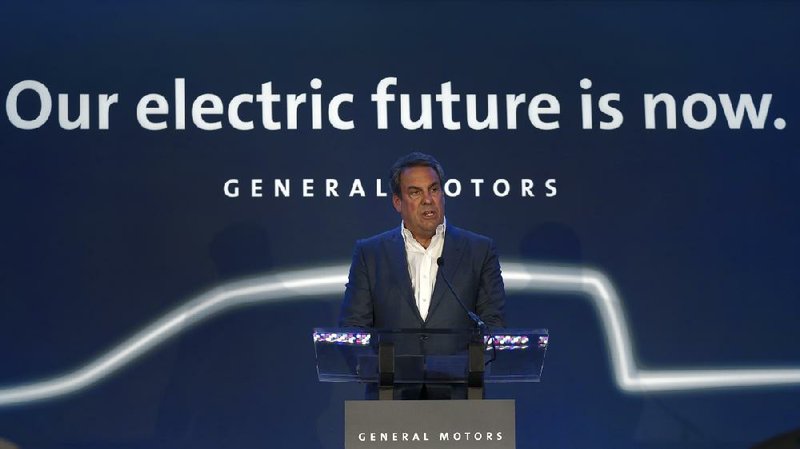DETROIT -- General Motors is investing $2.2 billion in its Detroit-Hamtramck Assembly plant to make it a state-of-the-art facility building electric and self-driving cars.
The automaker said Monday the plant will provide 2,200 jobs as it shifts to become the company's first all-electric vehicle plant.
"This will be General Motors' most technically advanced assembly plant," GM President Mark Reuss said in a news conference at the facility. "That's really amazing."
The plant is set to shut down for retooling over several months at the end of February, meaning about 800 hourly workers could be laid off or transferred. Union leaders have set up informational meetings with members starting today to inform workers about benefits and pending transfers.
GM said in a statement Monday that the factory will start building the company's first electric pickup late in 2021, followed by a self-driving shuttle for GM's Cruise Origin autonomous vehicle unit.
The truck will be the first of several electric vehicles to be built at the plant, which straddles the border between Detroit and the enclave of Hamtramck, Mich. The company has plans to revive the Hummer nameplate for one of the vehicles.
In November 2018, GM announced plans to close the factory along with three others in the U.S. But after a 40-day nationwide strike by the United Auto Workers union, the company pledged to invest $3 billion to retool Detroit-Hamtramck to build electric vehicles. On Monday, GM said it will put another $800 million toward supplier tooling and other projects related to new electric trucks.
Currently the plant is working on one shift with about 900 workers making the Cadillac CT6 and Chevrolet Impala sedans. Production of the Impala will stop at the end of February.
UAW Vice President Terry Dittes welcomed Monday's news, calling the announcement "a testament to the perseverance of our UAW members and UAW Region 1 under the direction of Frank Stuglin. Over 2,200 jobs and a new technology product will deliver job security and a bright economic future for UAW members for decades to come at Hamtramck."
UAW leaders say GM has suggested the current Detroit-Hamtramck workers could be transferred to its Fort Wayne, Ind., assembly plant or an assembly plant in Flint, Mich. GM builds its high-volume pickups at both factories.
"Any future people movement at Detroit-Hamtramck would be determined by the terms of the UAW national contract," GM spokesman Dan Flores said Friday.
Monday's announcement came days after Michigan's economic-development arm, the Michigan Strategic Fund, agreed to revise tax breaks for GM in exchange for the company's commitment to invest at least $3.5 billion more in the state over 10 years, including to build electric vehicles at Detroit-Hamtramck.
The value of the automaker's maximum state tax credit was cut by $325 million, to nearly $2.3 billion through 2029. GM still has to retain at least 34,750 jobs in Michigan -- it has about 45,000 now -- but got flexibility to count more jobs at its headquarters in Detroit and its research, development and engineering campus in the suburb of Warren.
GM already has announced plans in a joint venture with LG Chem to invest $2.3 billion to build a battery cell factory in Lordstown, Ohio. The factory will supply cells to vehicles made at the Detroit plant.
GM expects the Lordstown factory to employ up to 1,000 people. Last year the company closed a giant small-car assembly plant there that employed 4,000 people just two years ago.
Workers at the battery plant are likely to make less money than the roughly $30 per hour paid to vehicle assembly plant workers.
Legacy automakers are in a race with one another and a slew of startups and technology companies to capture growing demand for electric vehicles while also preparing for the advent of autonomous vehicles. GM's Cruise Origin, for example, faces competition from Uber and Waymo, which is a subsidiary of Google's parent company, Alphabet.
At the same time, that fight over an electric future has helped reinvigorate the U.S. automotive industry.
In 2018, Ford Motor announced that it had bought Michigan Central Station in Detroit, and would convert the abandoned office tower and train station -- a symbol of the city's decline -- into an urban campus focused on developing businesses that use self-driving cars.
Last year, Fiat Chrysler said it planned to spend $4.5 billion to update several Detroit plants, an investment that it said would create 6,500 jobs and let the company start making electric versions of its Jeep models if customer demand increased.
Information for this article was contributed by Jamie L. LaReau of the Detroit Free Press, by Tom Krisher of The Associated Press and by Niraj Chokshi of The New York Times.
Business on 01/28/2020
